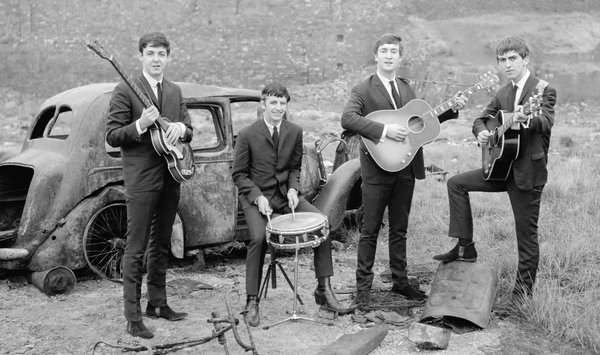Lewisohn, Mark, The Beatles: All These Years, Volume I, Tune In, Crown Archetype (Random House), New York, 2013 (932pp. $40)
Nowhere is it written in the long history of History that History unspools the carpet of happiness at our human feet. The history of History shows History mostly to be a bloody slog. But somehow, some way, one of the Demiurges working in the desperately grimy and sodden purlieus and slums of Liverpool brought together four working-class mutts whose grit, humor, talent, hard work and natural wit melded into a brotherhood that birthed a revolutionary new music whose job it was to bring us humans joy. And boy they did it in spades.
Tune In is the first volume of a projected three-volume history of the Beatles. Given the detailed scope, abundant research, and painstaking analysis contained in the first volume, the entire work promises to be the ultimate biographical statement about the Fab Four. The author, Mark Lewisohn, is billed as the “world’s only professional Beatles historian”, and rightly so, having penned a number of best-selling and influential Beatles books already, including The Complete Beatles Chronicle and The Beatles London, and having helped bring to life the multi-faceted The Beatles Anthology. Lewisohn’s writing in Tune In does indeed illustrate his unprecedented knowledge about the life and times of each Beatle, as well as their ancestors, friends, managers, band-mates and girlfriends.
John, Paul, George and Richy were kids of World War II, growing up in a Liverpool gray with war wreckage. John, the eldest, was a ruffian and hood with talent to burn, a loyal friend whose charm masked a decided loneliness. Paul was the chubby self-confident one whose father was musically adept, a man who gave Paul his first trumpet and encouraged him on piano, but who warned him away from John, who appeared a bad influence. George’s parents were wonderful, but appeared appalled that George hated school, slicked back his hair, and wore pegged pants. Richy endured a sickly childhood, with two long stays in grim, public hospitals that he barely survived. A scrawny kid going nowhere, he found the drums and became a first rate percussionist all by himself.
Along about the mid 1950s, smack in their teenage Teddy Boy prime, they discovered American rock n’ roll, as the music of Elvis, Little Richard, Gene Vincent and, at the end, Buddy Holly, descended on unhappy Liverpool. They discovered guitar. They quit school or failed every grade. They practiced and played and practiced and played some more. They sang naturally in a three-part harmonic structure inspired by the Everly Brothers, and then delivered as if it had come from heaven. Miraculously for the history of happiness, they discovered one another amid the disheveled row houses, docks, pubs and dirty industrial warrens of No Place. No rock and roll band anywhere, at any time, were more Brothers than they were Brothers.
Lewisohn’s book takes the Beatles from their childhoods up thorough those amazing days of fall, 1962, when Love Me Do hit the charts. In fact, he titles one chapter, “Friday, October 5, 1962—The Sixties Start Here”. Tune In is the ultimate chronicle, demonstrating how these four teenagers gave us everything—guitar music, harmony, the Long-Play album, tight live-performance. Paul’s screams—pure Little Richard. John’s sardonic sneer—pure Elvis. But everything else was pure Beatles. Given that Tune In has wonderful photos, exhaustive indexes and detailed notes, it is unlikely to be surpassed for both breadth and depth in any known universe.
I remember well that winter fifty years ago when I was working as a night cleanup boy at the old Boulevard Bowl on George Washington Boulevard. There was a jukebox at one end of the concourse and I loved listening to Roy Orbison while I emptied ashtrays and mopped up spilled beer. One dark night I heard something new, a song that went, “I wanna hold your haaaaand, I wanna hold your hand!” Break. “And when I touch you I feel happy, inside….”
That’s it. I was totally, completely, long gone. Happy as only a lonely teenage boy can be. Still am, whenever I hear the lads.


